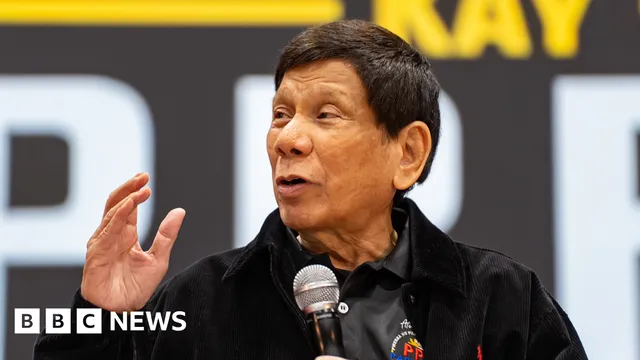
Duterte runs for mayor while detained in The Hague
2025-05-13 04:29- Rodrigo Duterte is detained in The Hague, awaiting a trial for crimes against humanity regarding his drug war.
- He is running for mayor of Davao City, raising concerns about governance from detention.
- The midterm elections may determine the future of Duterte family power in Philippine politics.
Express your sentiment!
Insights
In the Philippines, the midterm elections were marked by the candidacy of former President Rodrigo Duterte, who has been detained in The Hague since March awaiting trial for crimes against humanity stemming from his controversial drug war from 2016 to 2022. Despite his detention, Duterte is running for mayor of Davao City, a position he held for over two decades before his presidency. His return to politics poses questions about how he would govern from behind bars, yet he remains a favored candidate. The upcoming elections have significant implications for Duterte's family, especially for his daughter, Vice President Sara Duterte, who faces an impeachment trial in the Senate over serious accusations, including complicity in assassination plots against President Ferdinand Marcos Jr. and misuse of intelligence funds in her office. If convicted, Sara could be removed from office, which would limit her future political aspirations, including a potential run for the presidency in 2028. With the elections also determining half of the 24-member Senate and all 317 seats in the House of Representatives, the outcomes could influence the political landscape for years to come. Analyzing the situation, experts suggest that the midterm elections are crucial not just for the Duterte family but for the nation's political balance. Former political alliances have frayed, particularly between the Marcos and Duterte factions, raising questions about future governance and power dynamics in the country. The strained relationship was highlighted by a recent rally where Sara Duterte rallied supporters against the Marcos administration, indicating a robust sentiment amongst her family supporters. As over 68 million Filipinos prepared to cast their votes, the overarching narrative centered on whether the Duterte family could maintain their grip on power or see their political influence severely diminished depending on the election results. The elections, therefore, represent a critical turning point for both the Duterte family and the Philippines as a whole, as the electorate weighs their choices amidst allegations of corruption and criminality connected with the Duterte administration’s controversial drug policies.
Contexts
The impact of the Duterte family on Philippine politics has been significant and multifaceted, reflecting both regional and national dynamics. Rodrigo Duterte, as the 16th president of the Philippines from 2016 to 2022, has profoundly altered the political landscape through his controversial policies, particularly in the areas of law enforcement and governance. His approach to crime, notably the aggressive war on drugs, garnered both local and international criticism for its human rights implications but also solidified his support among various sectors of the population who viewed his governance style as a necessary response to crime and social disorder. The widespread popularity of his rhetoric and methods reinforced the Duterte family's prominence in both local and national politics, shaping voter perceptions and political affiliations across the country. The Duterte family's influence extends beyond Rodrigo, as his children have also engaged in political careers, thereby perpetuating their political legacy. His daughter, Sara Duterte, has served as the mayor of Davao City, replicating her father's tough-on-crime stance while also appealing to a different demographic through her public persona and approach. Her rise in national politics, particularly with her vice-presidential bid in the recent elections, illustrates the familial strategy of consolidating power and influence within key political positions. This dynastic approach continues to play a crucial role in Philippine politics, where political families often dominate the landscape and influence voter behavior and policy-making. Moreover, the Duterte family's legacy is characterized by a blend of populism and nationalism, resonating particularly with rural and working-class voters who feel marginalized by traditional political elites. The narrative of strong leadership and decisive governance taps into the historical context of political instability in the Philippines, allowing the Duterte family to portray themselves as defenders of the common people against external and internal threats. This has engendered a loyal political base, evidenced by significant electoral victories and support for candidates associated with the Duterte name. As discussions surrounding the rule of law and human rights continue, the Duterte family's political strategy enables them to navigate the fluctuating sentiments of the electorate while maintaining their status. As of May 2025, the implications of the Duterte family's political strategies remain a topic of crucial debate. Their influence on Philippine governance continues to evoke strong emotions, with supporters arguing for their approach while critics highlight the potential consequences for democratic norms and civil liberties. Moving forward, the future of Philippine politics will likely reflect the enduring legacy of the Duterte family, particularly in how subsequent political leaders choose to engage with or distance themselves from their policies and ideological frameworks. Understanding this impact is critical for analyzing the evolving political culture in the Philippines and forecasting future electoral trends and governance methodologies.